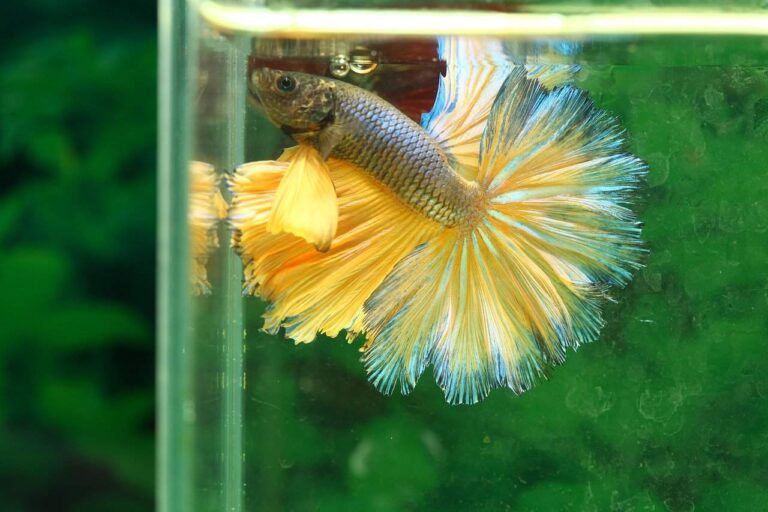Most bettas die because of two particular reasons – old age and sickness. Others fall a victim to adverse habitats. On most occasions, they’ll show symptoms which, if you know, help reveal their physiological condition.
So, how can you tell if yours is a dying betta? The older ones show signs like fading colors, loss of appetite and interest in making bubble nests, frequent naps, curled/ragged fins, white dots, gradual slimming, etc. Sick bettas show lethargy, dropsy, hunched back, rapid breathing, and slow reactions with loss of appetite and fading colors in common.
In this article, we’ll tell you how to find out if a betta fish is about to die. For this, you need to know the truth about the health of a betta with regards to its age, sickness, living atmosphere, and other factors that affect its life.

8 Symptoms of an Ageing Betta
The following signs are associated with changing looks or traits of the fish. They simply indicate that the betta of yours which was young once is no longer that way.
1. Fading Colors
It’s no wonder that the vibrant blue scale on the body would enchant you and anyone who looked at it. Now, you may see a shade of gray or brown. All that’s left is a fainting glory of its former self.
2. No Intention to Make Bubbles
A healthy betta makes bubble nests once in a few weeks. Some do this only a few times throughout the year. However, some healthy lives don’t make bubble nests because they may have significantly lost their sex drive with age. Procreation may not seem to be happening anymore.
3. Lethargy
Did you ever catch sight of a betta as it swims less and keeps hanging out at the tank’s bottom? Do its actions or reactions seem too lazy or slow for its nature? Unless depression or stress is the reason, age might be at play.
4. Frequent Naps
Two facts about how bettas sleep are relevant.
- They sleep and sometimes spend so much time that way.
- They sleep light.
As they age, some of them start taking naps more frequently than others, which is one of the obvious indications of their ageing process.
5. Curling/Rugged Fins
Just like many of us start losing the beauty of our hair as we near the end of our youth, bettas begin to have frayed and twisted fins and sometimes curled or ragged ends.
Note: Water with a high pH level may also be the cause. Nonetheless, you can’t rule out the possibility of a decayed lifespan.
6. Hunched Back
A hunch in a betta’s back is a common sight, particularly for old bettas. Both genders may develop it just enough to make you aware of its age.
7. Volatile White Dots
You may notice white dots on its face which might disappear after a week. Then again, the dots may appear on the parts of its head. At one point, the dots may stay for a longer period.
8. Skipped Meal and Leaner Body
It’s common in bettas that they develop a weak vision with time. You may see them thrusting the food forward instead of catching it. For some fish, it’s just the loss of appetite.
Either way, they fail to eat and become vulnerable to further weakness. Even with everything going just fine, your betta may not stay as healthy as it once used to. You may see it getting slimmer over time.
None of the above symptoms should necessarily ascertain the death of your betta. They only help you realize that the fish may not survive for another couple of years.
One More Thing to Understand about These Symptoms
An old betta usually develops some, if not all of these symptoms gradually. It usually take the fish to have two or more of them over the period of 3 to 8 months.
If two or more of them surface within a matter of (2-3) weeks, you can’t take it as a part of the ageing process. That fish must have been ill and/or stressed. A youthful betta shouldn’t show any of these unless it gets sick or seriously affected by something in the tank.
6 Signs of Deadly Diseases
If the age of a betta is out of the equation, diseases are the only important factors to bring certain symptoms into attention.
1. Dropsy (Kidney Failure)
A fatal illness, dropsy is recognizable by the swollen body with pine coning scales. You may see skin lesions too. The belly of the fish fills with excess fluids and gets swollen with the internal organs being damaged fast and gradually. Such a sight may strike a betta lover as bad news!
2. Flat Body on the Substrate
A betta that keeps lying down horizontally doesn’t make a happy scene. Staying flat without an upright position on the substrate makes a very fatal case.
Note: The fish may rest sometimes on the tank’s bottom. But if it stays upright, it’s okay. If the fish rests more frequently than its usual habit, it’s perhaps lethargy that makes it do so.
3. Fish Tuberculosis
Examine the spine of the betta. If it’s curved to the side or downward, slightly or significantly, and there’re lesions on its skin, it’s most likely affected by tuberculosis, which is a rare but sure sign of death.
4. Bloated Fish
Look at its belly. If you see it’s protruding outwardly, you’ve got a betta with a bloated stomach which is typically the result of constipation, swim bladder disease (characterized by trouble swimming), bacterial infection, shock, tumor, etc.
5. Betta with Velvet
Use as much light as possible to examine the scales. You might notice the shimmer of rust or gold. It’s most likely velvet that attacked your betta. The fish might be scratching or rubbing itself against an object in the tank or its walls. Other symptoms like lethargy, clamped fins, and loss of appetite may also become noticeable.
6. Trouble Breathing
Not as deadly as the above signs, it’s an early warning for the owner that the fish isn’t keeping well. Rapid breathing and continuous struggle may lead to exhaustion and premature death. It usually happens when there’s a problem with the quality of the water or the availability of oxygen in it.
2 Signs That Don’t Signal Imminent Death
These signs may look like the end of your betta’s life. But they’re only a situational factor or a pretense played by the fish.
1. Water Shock
Although you’re sure that the betta isn’t ill or somehow stressed, it may still appear dead, especially when they’re in a tank where the water is too cold or contaminated with ammonia or other similar chemicals.
An environment like this may cause the fish to have a physical shock and look like dying fast. The fish may start floating and looking dull as well.
2. Betta’s Habit to Play Dead
Some of these cute creatures do this out of their silly habits while others do it just for attention, the God knows why! But it should come as a shock. Sometimes, they pretend to remain dead for only a few minutes. Stubborn ones may play this way for half an hour.
You can have peace of mind by checking if a betta keeps breathing or its fins are moving. Tapping the tank walls a few times may also work.
That’s everything one can do to know whether their prized bettas are dying or not.
The average lifespan of betta fish is 3-5 years depending on the surroundings they’re allowed to live in. Some enjoy about a decade of life. Your favorite betta may live up to the average years under normal circumstances. But it may die much sooner than an old age, and if that happens, it’s unfortunate for any owner.
Knowing the above symptoms and causes may help you prepare for saving the valuable pet and taking preventive steps to avert a sad and unwanted end. Do you need more help with your betta? Feel free to ask!






